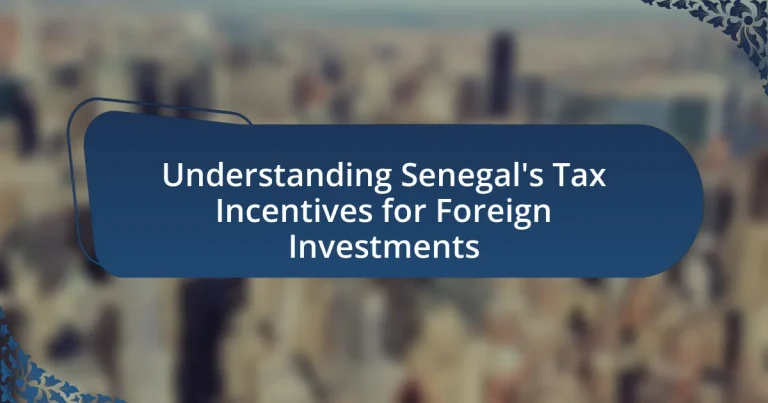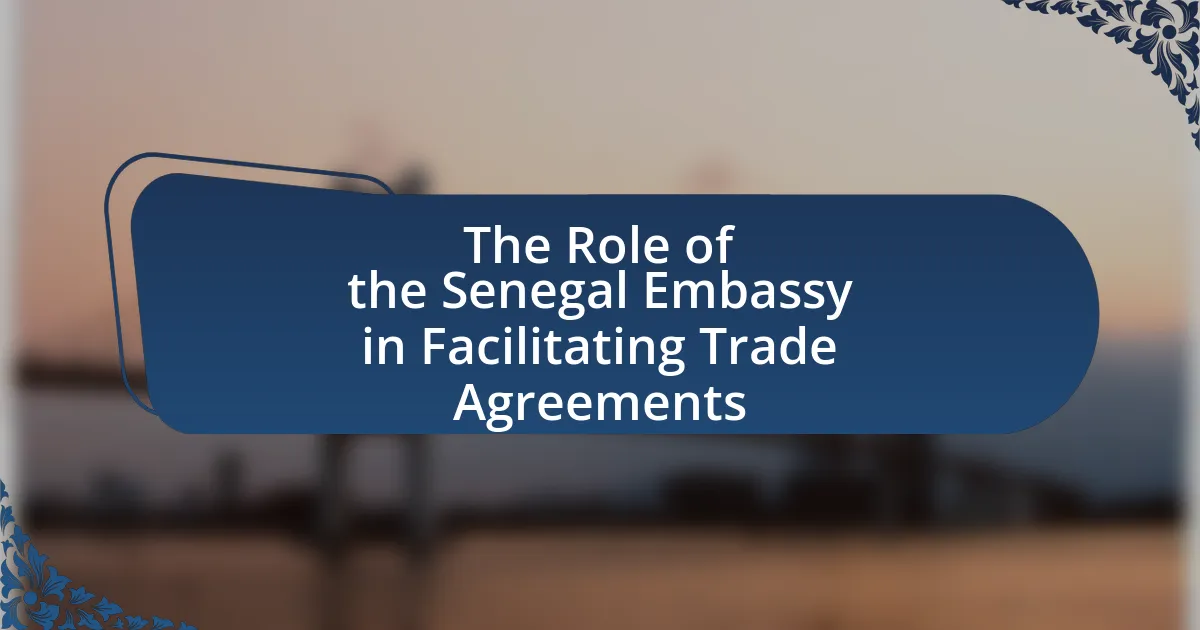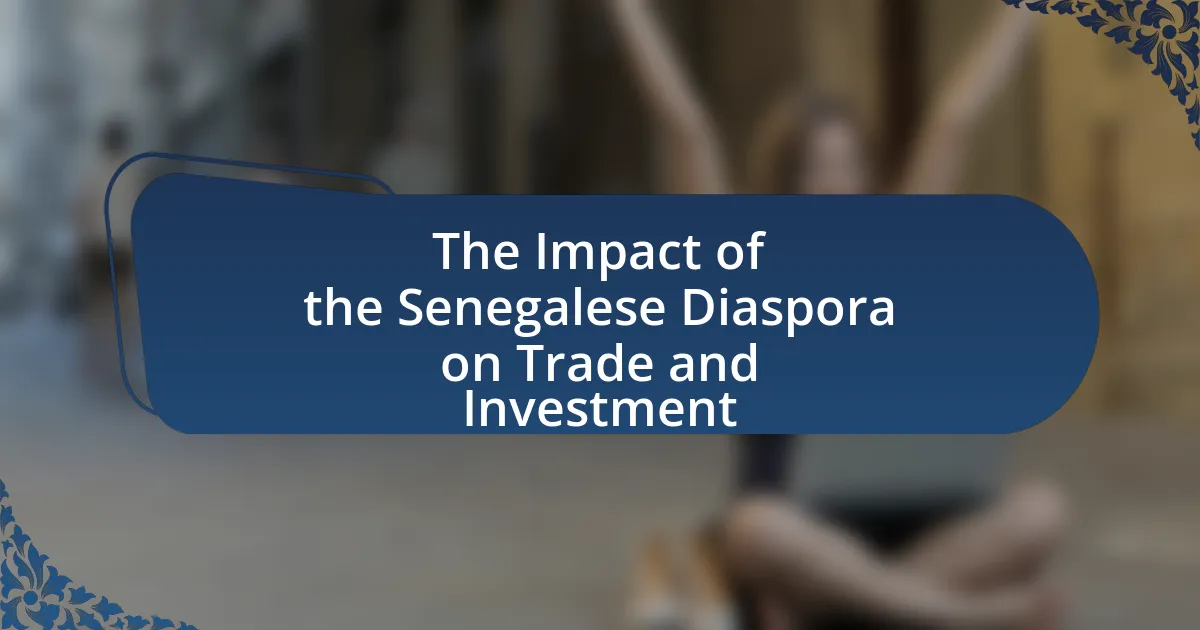Senegal’s tax incentives for foreign investments are designed to attract capital and stimulate economic growth. Key incentives include a reduced corporate tax rate of 15% for priority sectors such as agriculture, tourism, and renewable energy, along with exemptions from Value Added Tax (VAT) on imports related to investment projects. The Senegalese government also offers guarantees against expropriation and a stable legal framework, enhancing the investment climate. These measures have led to increased foreign direct investment inflows, contributing to job creation and infrastructure development, while positioning Senegal favorably compared to neighboring countries in terms of investment attractiveness.
What are Senegal’s Tax Incentives for Foreign Investments?
Senegal offers several tax incentives for foreign investments, including a corporate tax rate reduction, exemptions from certain taxes, and investment guarantees. Specifically, the corporate tax rate can be reduced to 15% for companies in priority sectors such as agriculture, tourism, and renewable energy. Additionally, foreign investors may benefit from a five-year exemption from the Value Added Tax (VAT) on imported goods and services related to their investment projects. The Senegalese government also provides guarantees against expropriation and offers a stable legal framework to protect foreign investments, which enhances the investment climate. These incentives are designed to attract foreign capital and stimulate economic growth in the country.
How do these tax incentives attract foreign investors?
Tax incentives attract foreign investors by reducing their overall tax burden, making investment opportunities more financially appealing. For instance, Senegal offers various incentives such as tax holidays, reduced corporate tax rates, and exemptions on import duties for specific sectors, which enhance the profitability of foreign investments. According to the Senegalese Investment Promotion Agency, these measures have led to increased foreign direct investment inflows, with a reported growth of 15% in foreign investments in sectors benefiting from these incentives over the past three years.
What specific tax benefits are available to foreign investors in Senegal?
Foreign investors in Senegal can benefit from several tax incentives, including a reduced corporate tax rate of 15% for companies in certain sectors, such as agriculture and tourism. Additionally, Senegal offers a tax exemption on profits for the first five years of operation for new investments in priority sectors. There are also provisions for exemptions from value-added tax (VAT) on imports of equipment and materials necessary for investment projects. These incentives are designed to attract foreign capital and stimulate economic growth, as outlined in the Senegalese Investment Code.
How do these incentives compare to other countries in the region?
Senegal’s tax incentives for foreign investments are generally more favorable compared to several neighboring countries in the region, particularly in terms of corporate tax rates and investment guarantees. For instance, Senegal offers a corporate tax rate of 30%, which is competitive when compared to Mali’s 35% and Guinea’s 30%, but Senegal provides additional benefits such as a 5-year tax holiday for certain sectors. Furthermore, Senegal’s Investment Code guarantees the protection of investments and repatriation of profits, which is more robust than the frameworks in countries like Gambia, where such protections are less clearly defined. These factors make Senegal an attractive destination for foreign investors relative to its regional counterparts.
Why are tax incentives important for economic growth in Senegal?
Tax incentives are crucial for economic growth in Senegal as they attract foreign direct investment (FDI), which stimulates job creation and infrastructure development. By offering reduced tax rates and exemptions, the Senegalese government encourages international companies to invest in various sectors, such as agriculture, energy, and technology. For instance, the Senegal Emerging Plan aims to boost FDI by providing tax breaks, which has led to a significant increase in investment inflows, contributing to a projected GDP growth rate of around 6% in recent years. This influx of capital not only enhances economic activity but also fosters innovation and competitiveness within the local market.
What role do foreign investments play in Senegal’s economy?
Foreign investments significantly contribute to Senegal’s economy by enhancing capital inflow, creating jobs, and fostering technological transfer. In 2021, foreign direct investment (FDI) inflows reached approximately $1.2 billion, primarily in sectors such as energy, mining, and agriculture. This influx of capital not only stimulates economic growth but also supports infrastructure development and improves the overall business environment. Additionally, foreign investments help to diversify Senegal’s economy, reducing reliance on traditional sectors and promoting sustainable development.
How do tax incentives impact local businesses and employment?
Tax incentives positively impact local businesses and employment by reducing operational costs and encouraging investment. These incentives, such as tax breaks or credits, enable businesses to allocate more resources toward expansion, hiring, and innovation. For instance, a study by the World Bank found that regions offering tax incentives experienced a 20% increase in new business formations and a corresponding rise in job creation. This correlation demonstrates that tax incentives can stimulate economic growth by attracting both local and foreign investments, ultimately benefiting the employment landscape in the area.
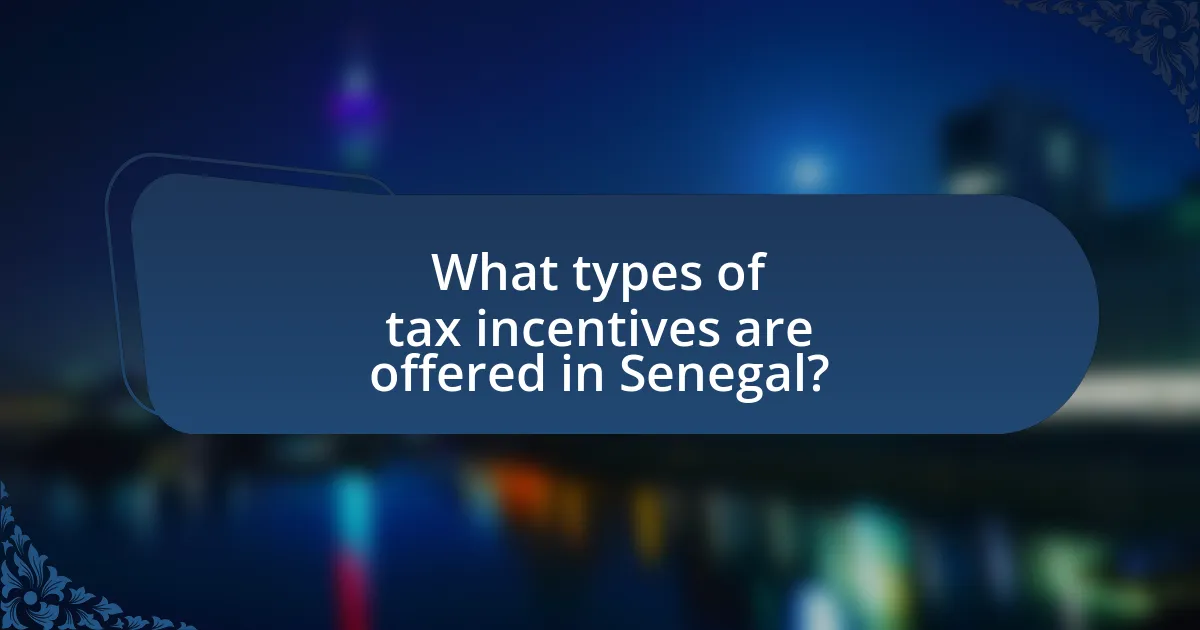
What types of tax incentives are offered in Senegal?
Senegal offers several types of tax incentives aimed at attracting foreign investments. These include corporate tax exemptions, which can last up to seven years for certain sectors, and reduced tax rates for investments in priority sectors such as agriculture, tourism, and renewable energy. Additionally, Senegal provides customs duty exemptions on imported equipment and materials necessary for investment projects. The Senegalese government also offers tax credits for research and development activities, further encouraging innovation and investment in the country. These incentives are designed to enhance the business environment and stimulate economic growth.
What are the main categories of tax incentives available?
The main categories of tax incentives available in Senegal include exemptions, reductions, and credits. Exemptions often apply to specific sectors such as agriculture, tourism, and renewable energy, allowing businesses to operate without certain taxes for a defined period. Reductions typically involve lower tax rates for foreign investments, particularly in priority sectors identified by the government. Credits may be offered for investments in infrastructure or research and development, providing a direct offset against tax liabilities. These incentives aim to attract foreign investment and stimulate economic growth in targeted industries.
How do corporate tax exemptions work for foreign investors?
Corporate tax exemptions for foreign investors in Senegal allow eligible companies to operate without paying certain taxes for a specified period. These exemptions are designed to attract foreign direct investment by reducing the overall tax burden, thereby encouraging economic growth and job creation. For instance, the Senegalese government offers tax holidays that can last from five to ten years, depending on the sector and the investment amount. Additionally, specific industries such as renewable energy, agriculture, and technology may receive enhanced incentives. The effectiveness of these exemptions is supported by Senegal’s strategic location and its membership in regional trade agreements, which facilitate access to broader markets.
What are the benefits of customs duty exemptions?
Customs duty exemptions provide significant financial advantages for businesses engaged in international trade. These exemptions reduce the overall cost of importing goods, allowing companies to allocate resources more efficiently and enhance their competitiveness in the market. For instance, businesses can lower their operational expenses, which can lead to increased profit margins and the ability to invest more in local operations or expansion. Additionally, customs duty exemptions can stimulate foreign investment by making it more attractive for international companies to enter the Senegalese market, thereby fostering economic growth and job creation.
How do investment promotion agencies facilitate these incentives?
Investment promotion agencies facilitate tax incentives by acting as intermediaries between foreign investors and the government, streamlining the application process for incentives. These agencies provide essential information about available tax benefits, assist in navigating regulatory requirements, and offer support in project implementation. For instance, in Senegal, the Agence de Promotion des Investissements et des Grands Travaux (APIX) plays a crucial role in promoting foreign direct investment by simplifying procedures and ensuring that investors can access tax exemptions and reductions efficiently. This support is vital for attracting foreign capital, as evidenced by Senegal’s increased foreign investment inflows, which reached approximately $1.2 billion in 2020, partly due to the efforts of such agencies.
What is the role of the Senegalese Investment Promotion Agency?
The Senegalese Investment Promotion Agency (APIX) is responsible for promoting and facilitating foreign investments in Senegal. APIX provides support to investors by offering information on investment opportunities, assisting with administrative procedures, and ensuring a favorable business environment. The agency plays a crucial role in attracting foreign direct investment, which is vital for economic growth and development in Senegal.
How can foreign investors access these incentives through government programs?
Foreign investors can access incentives through government programs by applying for specific tax incentive schemes established by the Senegalese government. These programs are designed to attract foreign capital and typically require investors to submit a formal application detailing their investment plans, including the nature of the business, projected job creation, and economic impact. The Senegalese Investment Promotion Agency (APIX) facilitates this process by providing guidance and support to investors, ensuring they meet the eligibility criteria outlined in the Investment Code. Additionally, the government offers various incentives, such as tax exemptions and reductions, which are contingent upon the investor’s compliance with local regulations and investment commitments.
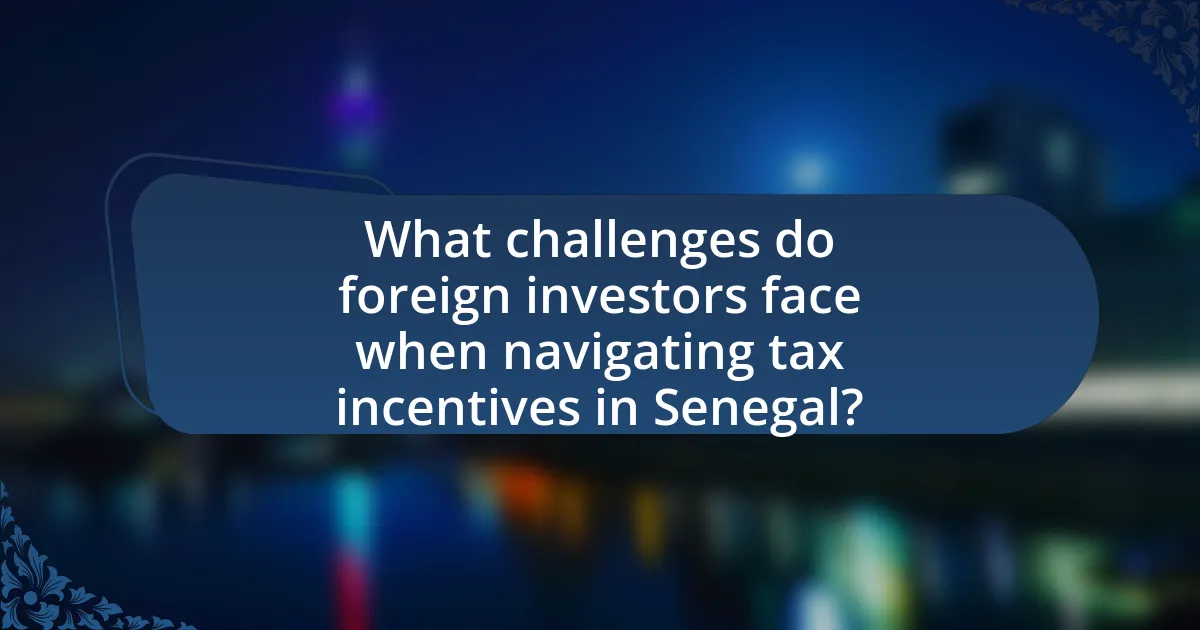
What challenges do foreign investors face when navigating tax incentives in Senegal?
Foreign investors in Senegal face several challenges when navigating tax incentives, primarily due to a lack of clarity and consistency in the regulatory framework. The complexity of tax laws, coupled with frequent changes in policies, creates uncertainty for investors. Additionally, bureaucratic inefficiencies and a slow administrative process can hinder the timely approval of tax incentives. According to the World Bank’s “Doing Business 2020” report, Senegal ranks low in ease of doing business, which reflects these challenges. Furthermore, the limited availability of reliable information regarding tax incentives can lead to misinterpretations and missed opportunities for foreign investors.
What bureaucratic hurdles might investors encounter?
Investors in Senegal may encounter bureaucratic hurdles such as complex regulatory frameworks, lengthy approval processes, and inconsistent enforcement of laws. The regulatory environment can be challenging due to multiple agencies involved in investment approvals, which can lead to delays and confusion. For instance, the Senegalese government requires various permits and licenses that can take several months to obtain, impacting the speed of investment execution. Additionally, the lack of transparency in administrative procedures can create uncertainty, making it difficult for investors to navigate the system effectively.
How can foreign investors overcome these challenges?
Foreign investors can overcome challenges in Senegal by leveraging the country’s tax incentives and engaging with local partners. By understanding and utilizing Senegal’s Investment Code, which offers benefits such as tax exemptions and reduced rates for specific sectors, investors can mitigate financial risks. Collaborating with local businesses can also provide insights into the regulatory landscape and cultural nuances, facilitating smoother operations. Additionally, seeking guidance from the Senegalese government’s investment promotion agency can help navigate bureaucratic hurdles effectively.
What resources are available for assistance in understanding tax regulations?
Resources available for assistance in understanding tax regulations include government websites, tax advisory firms, and legal professionals specializing in tax law. The Senegalese government provides official resources through its Ministry of Finance and the General Directorate of Taxes and Domains, which offer guidelines and updates on tax regulations. Additionally, reputable tax advisory firms like PwC and Deloitte publish insights and analyses on tax incentives and compliance in Senegal, aiding foreign investors in navigating the regulatory landscape. Legal professionals can also provide tailored advice based on specific investment scenarios, ensuring compliance with local tax laws.
What best practices should foreign investors follow to maximize tax incentives?
Foreign investors should conduct thorough research on Senegal’s tax laws and incentives to maximize tax benefits. Understanding the specific tax incentives available, such as exemptions on corporate income tax for certain sectors, can significantly enhance investment returns. Additionally, engaging with local tax advisors ensures compliance with regulations and helps identify applicable incentives. Investors should also consider structuring investments through eligible entities to take advantage of preferential tax rates. According to the Senegalese Investment Promotion Agency, sectors like agriculture, tourism, and renewable energy offer substantial tax breaks, reinforcing the importance of sector-specific investment strategies.
How can investors ensure compliance with Senegalese tax laws?
Investors can ensure compliance with Senegalese tax laws by engaging local tax advisors who are knowledgeable about the current regulations and requirements. These advisors can provide guidance on tax obligations, including corporate tax rates, value-added tax, and any applicable incentives for foreign investments. Furthermore, investors should regularly review the Senegalese tax code and stay updated on any changes to legislation, as the government may introduce new policies or amendments that affect tax compliance. Engaging with the Senegalese tax authority and participating in workshops or seminars can also enhance understanding and adherence to tax laws.
What strategies can be employed to effectively utilize tax incentives?
To effectively utilize tax incentives, businesses should conduct thorough research on available incentives, align their investment strategies with the criteria set by the Senegalese government, and maintain compliance with regulatory requirements. Understanding the specific tax incentives offered, such as exemptions or reductions in corporate tax rates for foreign investments, allows businesses to maximize their financial benefits. For instance, the Senegalese Investment Code provides various incentives for sectors like agriculture and renewable energy, which can significantly reduce operational costs. Additionally, engaging with local tax advisors can ensure that businesses navigate the complexities of tax regulations effectively, thereby optimizing their tax positions and enhancing overall investment returns.
